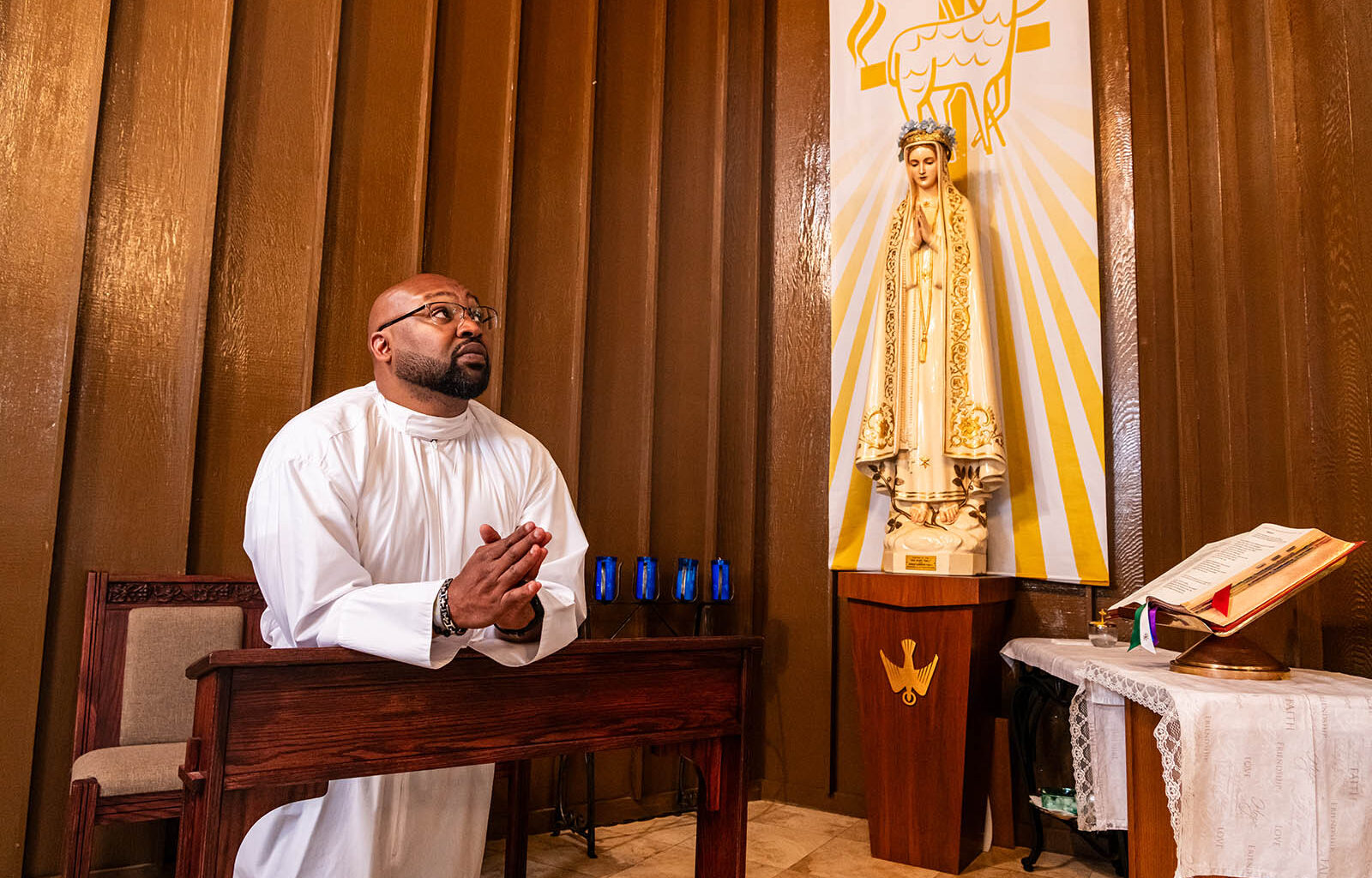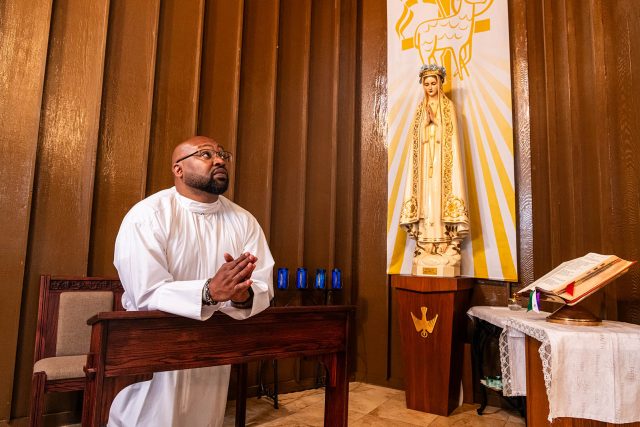 Brent Patterson, Acolyte/Lector, at Our Lady of Fátima Catholic Church in Birmingham’s historic Titusville neighborhood. (Amarr Croskey, For The Birmingham Times)
Brent Patterson, Acolyte/Lector, at Our Lady of Fátima Catholic Church in Birmingham’s historic Titusville neighborhood. (Amarr Croskey, For The Birmingham Times)By Sym Posey and Don Rhodes II | The Birmingham Times
“Shocked and excited.” “A powerful moment.” “Overwhelming.” “A pope for the people.”
Those were sentiments from a few Black Catholics in the Birmingham-area after Pope Leo XIV became the first North American and first person of Haitian and African American descent to be elected to lead the global Catholic community.
“I was shocked and excited when I heard that the pope was American,” said Brent Patterson, who has been a member of Our Lady of Fátima Catholic Church in Birmingham’s historic Titusville neighborhood for the past 14 years. “Shocked that in over 2,000 years of the church’s existence, no pope has been American. … Excited that he is American like me and potentially has Black, Creole, and Spanish [ancestry].”
Robert Francis Prevost was elected the 267th pope of the Roman Catholic Church on May 8, 2025, becoming the first Holy Father (a title of reverence used by Catholics to address the pope) from the United States. He took the name Pope Leo XIV and now leads the world’s 1.4 billion Roman Catholics, including 125,000 total in Birmingham — about 4,000 of which are Black, according to the Catholic Diocese of Birmingham in Alabama. He is the successor to Pope Francis (born Jorge Mario Bergoglio in Buenos Aires, Argentina), who died on April 21, 2025, at the age of 88 years old after serving 12 years as leader of the global Catholic community.
Pope Leo XIV was born in Chicago, Illinois, but 19th-century census records show that all four of his maternal great-grandparents were “free people of color” in Louisiana. The pope’s maternal family was part of a rich tradition of Black Catholicism in New Orleans, Louisiana, where African-descended individuals were introduced to the faith, according to census records.
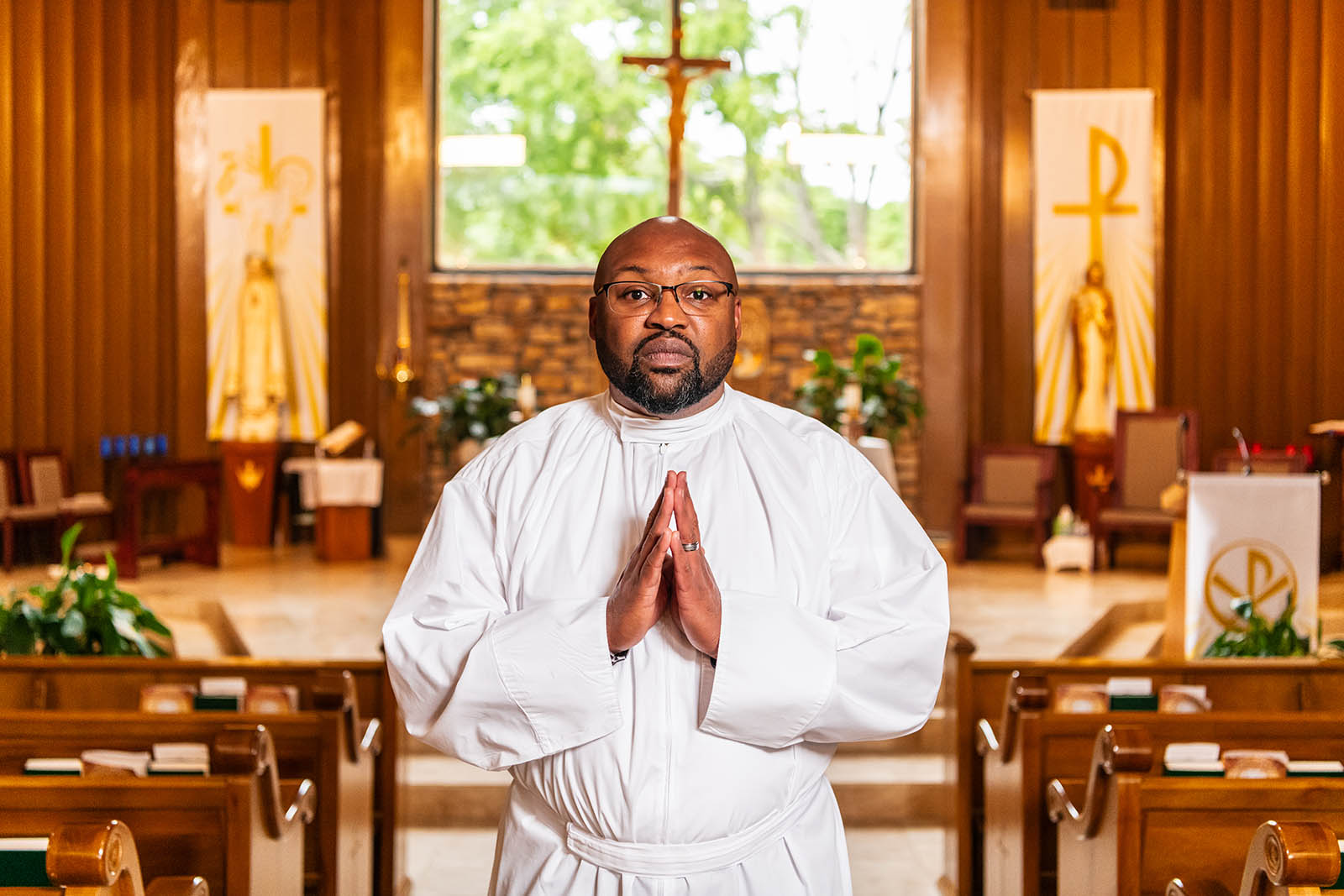 Brent Patterson, Acolyte/Lector, at Our Lady of Fátima Catholic Church in Birmingham’s historic Titusville neighborhood. (Amarr Croskey, For The Birmingham Times)
Brent Patterson, Acolyte/Lector, at Our Lady of Fátima Catholic Church in Birmingham’s historic Titusville neighborhood. (Amarr Croskey, For The Birmingham Times)
Patterson said Pope Leo XIV’s diverse background will “spark more interest in and bring more attention to Catholicism and to the Black and Brown Catholic communities that tend to get overlooked at times, especially in the South, [because] it helps Catholics in America feel like they are being seen.”
“With him having a potential Black, Creole, and Hispanic lineage, it opens it up for more representation for other minorities within the Catholic church,” added Patterson, who converted to Catholicism from Southern Baptist in April 2011.
“I felt in my heart that God was leading me to it,” he said. “It was just something about the Eucharist and the communal service of the church.”
Patterson currently serves the church in multiple roles: “I am the Acolyte/Lector, [someone appointed to read the Word of God], for Our Lady of Fátima Catholic Church and the [Eternal Word Television Network (EWTN)] of the Catholic Diocese of Birmingham in Alabama, [and an] Extraordinary Minister of Holy Communion,” also known as a Eucharistic Minister, or a lay person who assists with Holy Communion.
Patterson, 47, who resides in Pelham, Alabama, but used to live in Birmingham, said he is looking forward to seeing what Pope Leo XIV brings to the faithful, including a “solid philosophical and intellectual grasp of Biblical and Catholic doctrine by using his pastoral strengths to influence others as a bridge-builder and as a loving Servant of Christ.”
One of the pope’s alternative titles is that of Supreme “Pontiff,” or “bridge-builder.” According to the website Catholic Share, “In ancient Rome, [Pontiff] referred to priests who connected the human and divine through rituals.”
Here’s what some other Black Catholics in Birmingham had to say about the recently installed Pope Leo XIV:
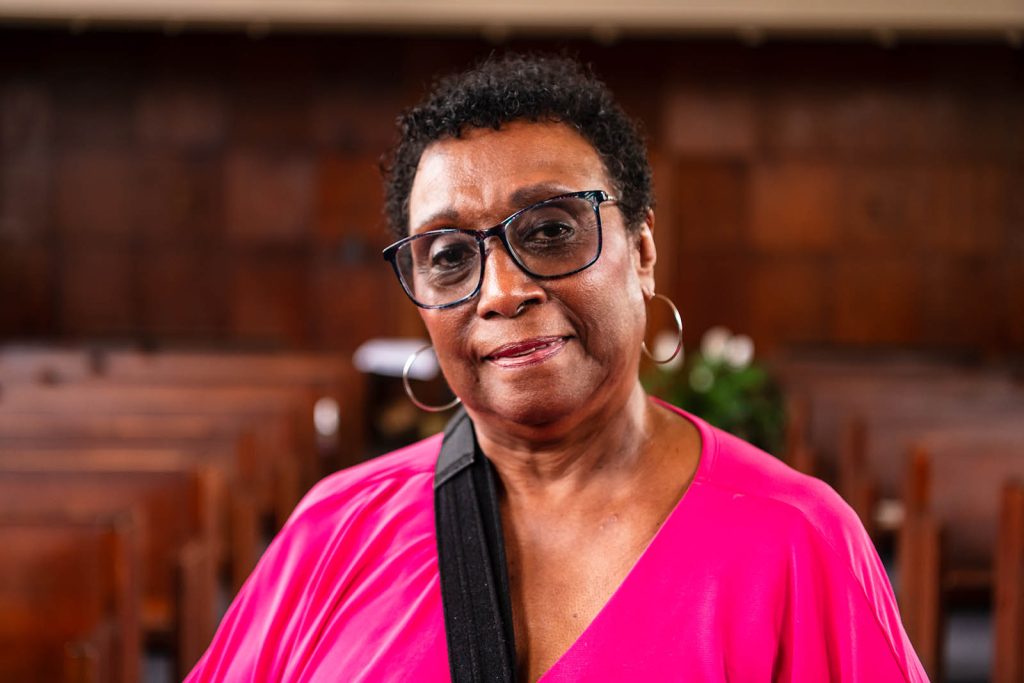 Edith Aguillard inside St. Francis of Assisi Catholic Church in Bessemer, Alabama. (Amarr Croskey, For The Birmingham Times)
Edith Aguillard inside St. Francis of Assisi Catholic Church in Bessemer, Alabama. (Amarr Croskey, For The Birmingham Times)
Edith Aguillard
Originally from New Orleans, Louisiana, Aguillard grew up as a “cradle Catholic,” someone who has been a Catholic from birth, raised in a Catholic family, and typically received the sacraments of Baptism, Confirmation, and First Communion since she was “four weeks old,” she said.
Hearing that Robert Francis Prevost had been elected to become the 267th occupant of the throne of St. Peter “was overwhelming for me.”
Another alternative title for the pope is “‘Successor of the Prince of the Apostles,’ referring to St. Peter, [who] is called the ‘prince’ because he was the leader among the apostles, chosen by Christ in John 21:15–17 to feed His sheep. The pope inherits this leadership as Peter’s direct successor.”
“I grew up with Pope John Paul XXIII, [who served from 1958 to 1963 and was canonized as a saint by Pope Francis in 2014], and things were a little bit different,” said Aguillard, 73, who attends St. Francis of Assisi Catholic Church in Bessemer, Alabama. “I think Pope Leo XIV is going to continue the work of Pope Francis. I think he will definitely be a builder of bridges.”
Aguillard added, “[Pope Leo XIV] is going to be one that connects the different churches and makes sure that the church is still being uplifted and growing at all times. His devotion to the Blessed Mother [Mary, the mother of Jesus Christ], I can connect to.”
Being Catholic in New Orleans was easy, said Aguillard, because “you have Catholic churches everywhere. … It was the most blessed piece of my life. I was my grandmother’s shadow. The Catholic parish that I belonged to in New Orleans actually started in the driveway of my grandparents’ home.”
When Aguillard moved to Birmingham in 1991, she visited several Catholic churches before finding a home at St. Francis of Assisi Catholic Church, where she has spent 32 years in numerous roles, including Director of Religious Education (DRE), a Lector, and a Eucharistic Minister.
“I also work with the youth when it comes to dance and sometimes choir, in addition to working in the atmosphere of the church. I do a lot of shifting of plants and things like that,” said Aguillard.
She loves what she does for her church, as well as the children who attend there: “I love my children. I love the youth and their involvement in the parish,” said Aguillard.
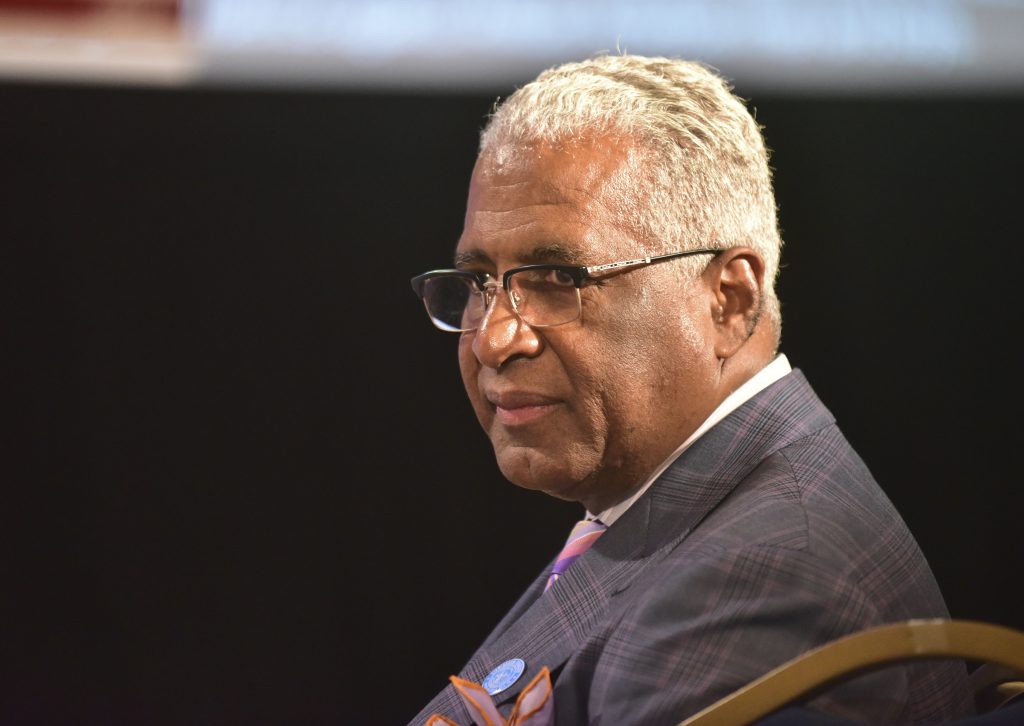 Former Birmingham Mayor William Bell is a lifelong Catholic and has been member of Our Lady Fátima Catholic Church in Birmingham’s historic Titusville neighborhood for more than 60 years. (File)
Former Birmingham Mayor William Bell is a lifelong Catholic and has been member of Our Lady Fátima Catholic Church in Birmingham’s historic Titusville neighborhood for more than 60 years. (File)
William A. Bell
“It’s just a powerful moment,” said former Birmingham Mayor Bell, a member of Our Lady Fátima Catholic Church for more than 60 years. “To see someone [of Haitian descent] with African American roots become pope, it’s like the church is finally reflecting the body of Christ in all its diversity.”
Bell credits Pope Francis, who served for 12 years as the Vicar of Christ, an alternative title that means the pope represents Christ on earth, for paving the way.
“Pope Francis gave the Cardinals a more global vision. His leadership helped them see the church not just through the eyes of Rome but through the hearts of people from every corner of the world. That made Pope Leo XIV’s election possible.”
Bell, 75, a lifelong Catholic, said his family has been Catholic for generations, “but I’ve never seen something like this. It’s like watching history—like when Obama became president” in 2008.
The former mayor drew parallels between the election of Pope Leo XIV and a renewed sense of hope in the church.
“This isn’t just about where he’s from,” Bell said. “It’s about what he represents. A faith that embraces all people. A church that’s growing and evolving.”
One of the most talked-about aspects of the new pope is his choice of name — Leo — instead of following his predecessor in choosing to be Pope Francis II.
Bell said that choosing a name is deeply symbolic: “He chose Leo to honor both Pope Leo XIII, who served from 1878 to 1903 and was known for advocating for the poor, and St. Francis [of Assisi], who gave up everything for the sake of service. It sends a powerful message.”
 Charles Benjamin outside Blessed Sacrament Catholic Church in Southwest Birmingham, (Marika N. Johnson, For The Birmingham Times)
Charles Benjamin outside Blessed Sacrament Catholic Church in Southwest Birmingham, (Marika N. Johnson, For The Birmingham Times)
Charles Benjamin
Charles Benjamin, who attends Blessed Sacrament Catholic Church in Southwest Birmingham, said, “I’m a huge fan of Pope Francis, and I already love Pope Leo XIV.”
“He was elected so quickly because he’s real — you can see Christ in him,” He added. “He walks the walk and talks the talk. He’s a pope for the people.”
Benjamin highlighted how Pope Leo XIV’s leadership is grounded in Scripture, particularly the 25th chapter of Matthew, which emphasizes caring for the poor and marginalized.
“That’s who Pope Leo XIV is. He wants us to come together as one body in Christ, and he’s leading by example,” he said.
Learning about the pope’s Haitian roots and Creole heritage has also inspired many.
“He’s bringing his own flavor to the name and to the office,” Benjamin added. “It’s exciting to see someone lead the church who reflects both where we’ve been and where we’re going.”
